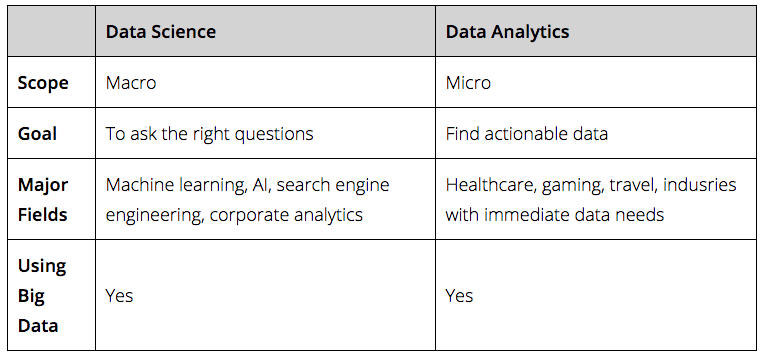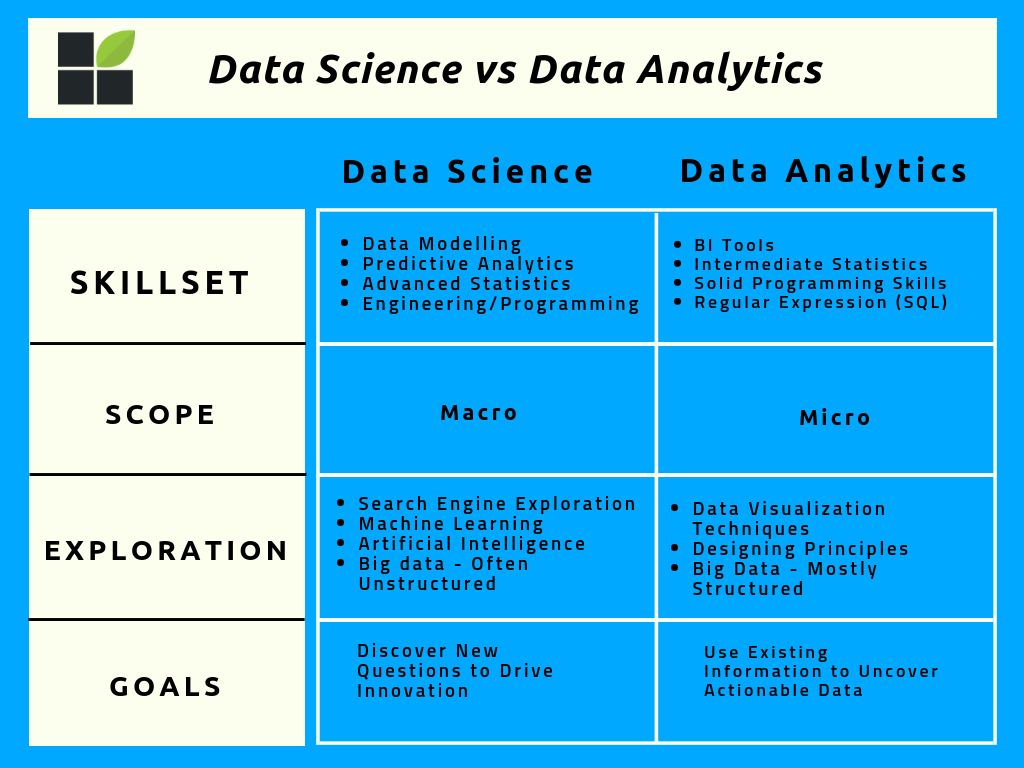Big data has become a major component in the tech world today thanks to the actionable insights and results businesses can glean. However, the creation of such large datasets also requires understanding and having the proper tools on hand to parse through them to uncover the right information. To better comprehend big data, the fields of data science and analytics have gone from largely being relegated to academia, to instead becoming integral elements of business intelligence and big data analytics tools.
However, it can be confusing to differentiate between data analytics and data science. Despite the two being interconnected, they provide different results and pursue different approaches. If you need to study data your business is producing, it's vital to grasp what they bring to the table and how each is unique. To help you optimize your big data analytics, we break down both categories, examine their differences, and reveal the value they deliver.
What Is Data Science?
Data science is a multidisciplinary field focused on finding actionable insights from large sets of raw and structured data. The field primarily fixates on unearthing answers to the things we don't know we don't know. Data science experts use several different techniques to obtain answers, incorporating computer science, predictive analytics, statistics, and machine learning to parse through massive data sets in an effort to establish solutions to problems that haven't been thought of yet.
Data scientists' main goal is to ask questions and locate potential avenues of study, with less concern for specific answers and more emphasis placed on finding the right question to ask. Experts accomplish this by predicting potential trends, exploring disparate and disconnected data sources, and finding better ways to analyze information.
What Is Data Analytics?
Data analytics focuses on processing and performing statistical analysis on existing datasets. Analysts concentrate on creating methods to capture, process, and organize data to uncover actionable insights for current problems, and establishing the best way to present this data. More simply, the field of data analytics is directed towards solving problems for questions we know we don't know the answers to. More importantly, it's based on producing results that can lead to immediate improvements.
Data analytics also encompasses a few different branches of broader statistics and analysis which help combine diverse sources of data and locate connections while simplifying the results.
What Is the Difference?
While many people use the terms interchangeably, data science and big data analytics are unique fields, with the major difference being the scope. Data science is an umbrella term for a group of fields that are used to mine large data sets. Data analytics is a more focused version of this and can even be considered part of the larger process. Analytics is devoted to realizing actionable insights that can be applied immediately based on existing queries.
Another significant difference in the two fields is a question of exploration. Data science isn't concerned with answering specific queries, instead parsing through massive data sets in sometimes unstructured ways to expose insights. Data analysis works better when it is focused, having questions in mind that need answers based on existing data. Data science produces broader insights that concentrate on which questions should be asked, while big data analytics emphasizes discovering answers to questions being asked.
More importantly, data science is more concerned about asking questions than finding specific answers. The field is focused on establishing potential trends based on existing data, as well as realizing better ways to analyze and model data.


The two fields can be considered different sides of the same coin, and their functions are highly interconnected. Data science lays important foundations and parses big data sets to create initial observations, future trends, and potential insights that can be important. This information by itself is useful for some fields especially modeling, improving machine learning, and enhancing AI algorithms as it can improve how information is sorted and understood. However, data science asks important questions that we were unaware of before while providing little in the way of hard answers. By adding data analytics into the mix, we can turn those things we know we don't know into actionable insights with practical applications.
When thinking of these two disciplines, it's important to forget about viewing them as data science vs. data analytics. Instead, we should see them as parts of a whole that are vital to understanding not just the information we have, but how to better analyze and review it.
Is data analytics and data science related?
There are many differences between them if you will see in a concentrated way.
Now, let’s see the differences between Data Science and Data Analytics.
Start with the definitions:
Data Scientist vs Data Analyst according to Definition
- A Data Scientist role is to predict future based on past patterns. While Data analyst finds meaningful information from data.
- The role of Data scientist is to generate its own question. But Data analyst finds the answers to others sets of questions.
- As Data scientists have the what ifs. But Data analysts are the ones who do the day-to-day analysis
- Data scientist addresses business problems. It also gives an accurate prediction of the value of business once solved. Whereas Data Analyst only address business problems
- Data scientist uses machine learning for extracting information. But Data Analyst uses an R / SAS tool for extracting information.
- The role of Data scientist is to explore and examines information. He explores information from many disconnected sources. But Data Analyst explores and examines data from a single source.
- The prediction of Data Scientist is very high. It can be accurate up to 90%. But, Data analysts don’t predict. They only solve the question given by the business.
- A Data scientists will formulate questions. They formulate those questions whose solutions are likely to benefit the business. But Data Analyst only solves the questions given by business.
- A Data scientist must have sound knowledge in statistical models and machine learning. Data Analyst needs sound knowledge in SAS/R
Data Analyst vs Data Scientist according to Responsibilities
a) A Data Scientist Responsibilities
- Data cleansing and processing.
- Prediction of the business problem. His roles are to give future results of that business.
- Develop machine learning models and analytical methods.
- Find new business questions that can then add value to the business.
- Data mining using state-of-the-art methods.
- Presenting results in a clear manner and doing the ad-hoc analysis.
b) Data Analyst Responsibilities
- Identify any data quality issues in data acquisition.
- Solving business problems. By mapping and then tracing the data.
- A Data analyst should coordinate with engineers to gather new data.
- Perform statistical analysis of business data.
- Documenting the types and structure of the business data.
4.3. Data Analyst vs Data Scientist roles based on skill sets
a) Data Scientist roles according to their skill sets
- The Data creatives
- Data Developers
- Data Researchers
- The Data Businesspeople
b) Data Analyst roles according to their skill sets
- Database Administrators
- Operations
- The Data Architects
- A Data Analysts
4.4. Data Scientist vs Data Analyst – Salary
Below statistics shows the salary of Data Scientist vs Data Analyst-


